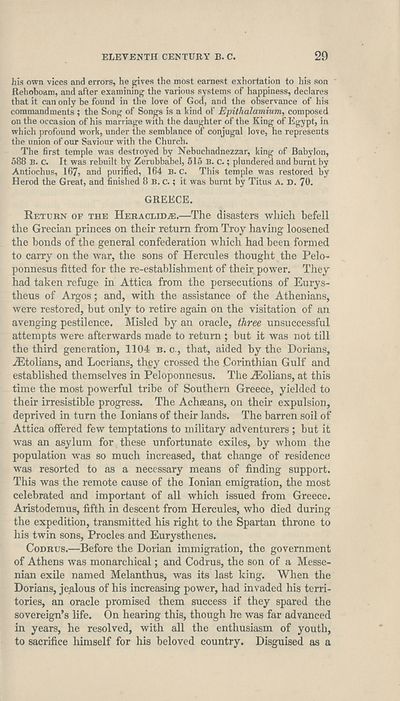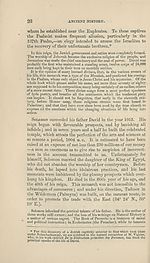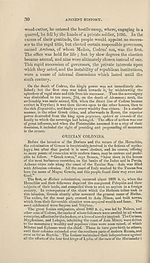Download files
Complete book:
Individual page:
Thumbnail gallery: Grid view | List view

ELEVENTH CENTURY B. C.
29
his own vices and errors, he pives the most earnest exhortation to his son
Rehoboam, and after examining the various systems of happiness, declares
that it can only be found in the love of God, and the observance of his
commandments ; the Song of Songs is a kind of Epithalamium, composed
on the occasion of his marriage with the daughter of the King of Kgypt, in
which profound work, under the semblance of conjugal love, he represents
the union of our Saviour with the Church.
The first temple was destroyed by Nebuchadnezzar, king of Babylon,
588 B. c. It was rebuilt by Zerubbabel, 515 B. c.; plundered and burnt by
Antiochus, 167, and purified, 164 B. c. This temple was restored by
Herod the Great, and finished 8 B. c.; it was burnt by Titus A. D. 70.
GREECE.
Return of the Heraclida:.—The disasters which befell
the Grecian princes on their return from Troy having loosened
the bonds of the general confederation which had been formed
to carry on the war, the sons of Hercules thought the Pelo¬
ponnesus fitted for the re-establishment of their, power. They
had taken refuge in Attica from the persecutions of Eurys-
theus of Argos; and, with the assistance of the Athenians,
were restored, but only to retire again on the visitation of an
avenging pestilence. Misled by an oracle, three unsuccessful
attempts were afterwards made to return ; but it was not till
the third generation, 1104 b. c., that, aided by the Dorians,
zEtolians, and Locrians, they crossed the Corinthian Gulf and
established themselves in Peloponnesus. The ASolians, at this
time the most powerful tribe of Southern Greece, yielded to
their irresistible progress. The Achseans, on their expulsion,
deprived in turn the lonians of their lands. The barren soil of
Attica offered few temptations to military adventurers ; but it
was an asylum for these unfortunate exiles, by whom the
population was so much increased, that change of residence
was resorted to as a necessary means of finding support.
This was the remote cause of the Ionian emigration, the most
celebrated and important of all which issued from Greece.
Aristodemus, fifth in descent from Hercules, who died during
the expedition, transmitted his right to the Spartan throne to
his twin sons, Procles and Eurysthenes.
Codrus.—Before the Dorian immigration, the government
of Athens was monarchical; and Codrus, the son of a Messe-
nian exile named Melanthus, was its last king. When the
Dorians, jealous of his increasing power, had invaded his terri¬
tories, an oracle promised them success if they spared the
sovereign’s life. On hearing this, though he was far advanced
in years, he resolved, with all the enthusiasm of youth,
to sacrifice himself for his beloved country. Disguised as a
29
his own vices and errors, he pives the most earnest exhortation to his son
Rehoboam, and after examining the various systems of happiness, declares
that it can only be found in the love of God, and the observance of his
commandments ; the Song of Songs is a kind of Epithalamium, composed
on the occasion of his marriage with the daughter of the King of Kgypt, in
which profound work, under the semblance of conjugal love, he represents
the union of our Saviour with the Church.
The first temple was destroyed by Nebuchadnezzar, king of Babylon,
588 B. c. It was rebuilt by Zerubbabel, 515 B. c.; plundered and burnt by
Antiochus, 167, and purified, 164 B. c. This temple was restored by
Herod the Great, and finished 8 B. c.; it was burnt by Titus A. D. 70.
GREECE.
Return of the Heraclida:.—The disasters which befell
the Grecian princes on their return from Troy having loosened
the bonds of the general confederation which had been formed
to carry on the war, the sons of Hercules thought the Pelo¬
ponnesus fitted for the re-establishment of their, power. They
had taken refuge in Attica from the persecutions of Eurys-
theus of Argos; and, with the assistance of the Athenians,
were restored, but only to retire again on the visitation of an
avenging pestilence. Misled by an oracle, three unsuccessful
attempts were afterwards made to return ; but it was not till
the third generation, 1104 b. c., that, aided by the Dorians,
zEtolians, and Locrians, they crossed the Corinthian Gulf and
established themselves in Peloponnesus. The ASolians, at this
time the most powerful tribe of Southern Greece, yielded to
their irresistible progress. The Achseans, on their expulsion,
deprived in turn the lonians of their lands. The barren soil of
Attica offered few temptations to military adventurers ; but it
was an asylum for these unfortunate exiles, by whom the
population was so much increased, that change of residence
was resorted to as a necessary means of finding support.
This was the remote cause of the Ionian emigration, the most
celebrated and important of all which issued from Greece.
Aristodemus, fifth in descent from Hercules, who died during
the expedition, transmitted his right to the Spartan throne to
his twin sons, Procles and Eurysthenes.
Codrus.—Before the Dorian immigration, the government
of Athens was monarchical; and Codrus, the son of a Messe-
nian exile named Melanthus, was its last king. When the
Dorians, jealous of his increasing power, had invaded his terri¬
tories, an oracle promised them success if they spared the
sovereign’s life. On hearing this, though he was far advanced
in years, he resolved, with all the enthusiasm of youth,
to sacrifice himself for his beloved country. Disguised as a
Set display mode to:
![]() Universal Viewer |
Universal Viewer | ![]() Mirador |
Large image | Transcription
Mirador |
Large image | Transcription
| Antiquarian books of Scotland > Education > Elements of universal history on a new and systematic plan > (49) |
|---|
| Permanent URL | https://digital.nls.uk/127580728 |
|---|
| Description | Thousands of printed books from the Antiquarian Books of Scotland collection which dates from 1641 to the 1980s. The collection consists of 14,800 books which were published in Scotland or have a Scottish connection, e.g. through the author, printer or owner. Subjects covered include sport, education, diseases, adventure, occupations, Jacobites, politics and religion. Among the 29 languages represented are English, Gaelic, Italian, French, Russian and Swedish. |
|---|

